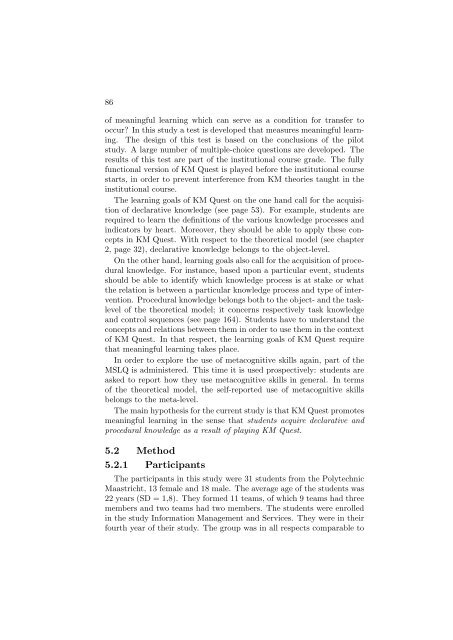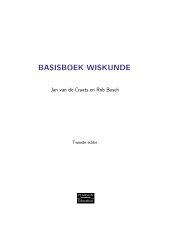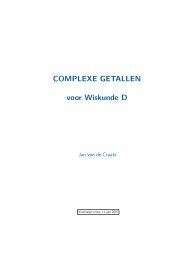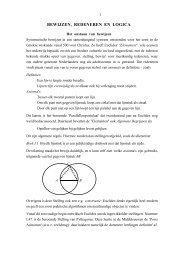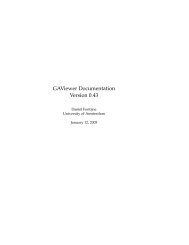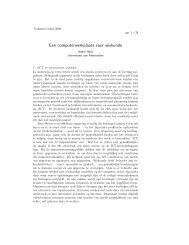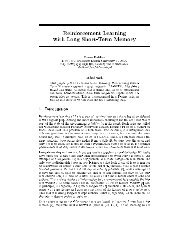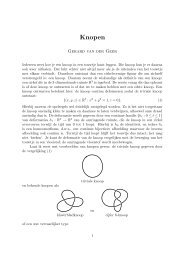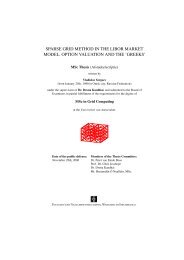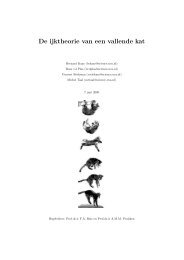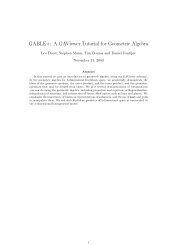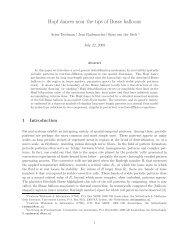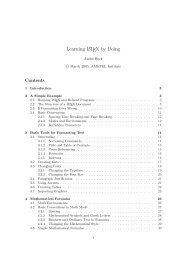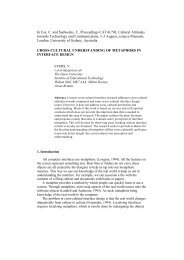The role of metacognitive skills in learning to solve problems
The role of metacognitive skills in learning to solve problems
The role of metacognitive skills in learning to solve problems
Create successful ePaper yourself
Turn your PDF publications into a flip-book with our unique Google optimized e-Paper software.
86<br />
<strong>of</strong> mean<strong>in</strong>gful learn<strong>in</strong>g which can serve as a condition for transfer <strong>to</strong><br />
occur? In this study a test is developed that measures mean<strong>in</strong>gful learn<strong>in</strong>g.<br />
<strong>The</strong> design <strong>of</strong> this test is based on the conclusions <strong>of</strong> the pilot<br />
study. A large number <strong>of</strong> multiple-choice questions are developed. <strong>The</strong><br />
results <strong>of</strong> this test are part <strong>of</strong> the <strong>in</strong>stitutional course grade. <strong>The</strong> fully<br />
functional version <strong>of</strong> KM Quest is played before the <strong>in</strong>stitutional course<br />
starts, <strong>in</strong> order <strong>to</strong> prevent <strong>in</strong>terference from KM theories taught <strong>in</strong> the<br />
<strong>in</strong>stitutional course.<br />
<strong>The</strong> learn<strong>in</strong>g goals <strong>of</strong> KM Quest on the one hand call for the acquisition<br />
<strong>of</strong> declarative knowledge (see page 53). For example, students are<br />
required <strong>to</strong> learn the def<strong>in</strong>itions <strong>of</strong> the various knowledge processes and<br />
<strong>in</strong>dica<strong>to</strong>rs by heart. Moreover, they should be able <strong>to</strong> apply these concepts<br />
<strong>in</strong> KM Quest. With respect <strong>to</strong> the theoretical model (see chapter<br />
2, page 32), declarative knowledge belongs <strong>to</strong> the object-level.<br />
On the other hand, learn<strong>in</strong>g goals also call for the acquisition <strong>of</strong> procedural<br />
knowledge. For <strong>in</strong>stance, based upon a particular event, students<br />
should be able <strong>to</strong> identify which knowledge process is at stake or what<br />
the relation is between a particular knowledge process and type <strong>of</strong> <strong>in</strong>tervention.<br />
Procedural knowledge belongs both <strong>to</strong> the object- and the tasklevel<br />
<strong>of</strong> the theoretical model; it concerns respectively task knowledge<br />
and control sequences (see page 164). Students have <strong>to</strong> understand the<br />
concepts and relations between them <strong>in</strong> order <strong>to</strong> use them <strong>in</strong> the context<br />
<strong>of</strong> KM Quest. In that respect, the learn<strong>in</strong>g goals <strong>of</strong> KM Quest require<br />
that mean<strong>in</strong>gful learn<strong>in</strong>g takes place.<br />
In order <strong>to</strong> explore the use <strong>of</strong> <strong>metacognitive</strong> <strong>skills</strong> aga<strong>in</strong>, part <strong>of</strong> the<br />
MSLQ is adm<strong>in</strong>istered. This time it is used prospectively: students are<br />
asked <strong>to</strong> report how they use <strong>metacognitive</strong> <strong>skills</strong> <strong>in</strong> general. In terms<br />
<strong>of</strong> the theoretical model, the self-reported use <strong>of</strong> <strong>metacognitive</strong> <strong>skills</strong><br />
belongs <strong>to</strong> the meta-level.<br />
<strong>The</strong> ma<strong>in</strong> hypothesis for the current study is that KM Quest promotes<br />
mean<strong>in</strong>gful learn<strong>in</strong>g <strong>in</strong> the sense that students acquire declarative and<br />
procedural knowledge as a result <strong>of</strong> play<strong>in</strong>g KM Quest.<br />
5.2 Method<br />
5.2.1 Participants<br />
<strong>The</strong> participants <strong>in</strong> this study were 31 students from the Polytechnic<br />
Maastricht, 13 female and 18 male. <strong>The</strong> average age <strong>of</strong> the students was<br />
22 years (SD = 1,8). <strong>The</strong>y formed 11 teams, <strong>of</strong> which 9 teams had three<br />
members and two teams had two members. <strong>The</strong> students were enrolled<br />
<strong>in</strong> the study Information Management and Services. <strong>The</strong>y were <strong>in</strong> their<br />
fourth year <strong>of</strong> their study. <strong>The</strong> group was <strong>in</strong> all respects comparable <strong>to</strong>


